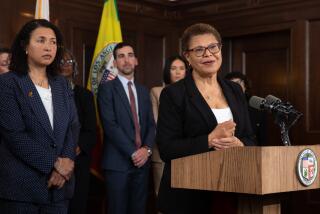Eric Garcetti faces tough tests when he takes office as mayor
- Share via
In the campaign for mayor, Eric Garcetti spoke grandly about a city with plentiful summer jobs for low-income teens, a tunnel under the traffic-clogged Sepulveda Pass and even an end to homelessness.
But a day after winning office, the mayor-elect faced some immediate and less lofty challenges: potentially bruising battles over employee salaries, police overtime pay and how to reverse cuts to ambulance staffing, sidewalk repairs and other basic city services.
On Thursday, the City Council — a body that Garcetti will remain part of until June 30 — is set to decide whether and how to pay for a scheduled 5.5% raise for many city workers, a payout portrayed by the city’s top financial advisor as a long-term budget buster.
And by the end of the year, Garcetti and the council’s leadership must launch new contract talks with unions representing police officers, firefighters, clerks, tree trimmers and workers at the Department of Water and Power — all of whom worked furiously to deny him the job of mayor.
Garcetti’s clear victory could give him the upper hand in those negotiations. But he will still need to proceed cautiously, particularly with the powerful DWP union, which was featured prominently in Garcetti TV ads attacking rival Wendy Greuel.
“The potential for them going on strike, or having walkouts or slowdowns, is real,” said longtime City Hall lobbyist Steve Afriat. “The potential for that happening when it’s 110 degrees in the San Fernando Valley is also real.”
Brian D’Arcy, the top executive at the DWP union, did not respond to a request for comment. But Garcetti dismissed the likelihood of job actions in coming months, saying he is “an accomplished and experienced negotiator.”
“I know the best way to do that is not by firing salvos, but by relational work behind the scenes,” he said. “I’m going to be spending my time doing that with all of our unions, saying we have problems to solve and invite them to solve those problems together.”
The city’s financial woes provided a major backdrop for the mayoral election, coming after decisions by Mayor Antonio Villaraigosa and the City Council to scale back services and reduce the workforce by 5,300 positions. Even with the economy starting to recover, the city’s top budget analyst, City Administrative Officer Miguel Santana, has recommended that the 5.5% raise, which comes due on Jan. 1, be renegotiated.
“The good news is that the economy is getting better, so we’re projecting increased revenues,” he said. “But they aren’t enough to cover the increased costs” from more salary hikes and other expenditures.
With Santana warning of deficits between 2014 and 2016, the issue of employee costs could divert Garcetti from his efforts to make L.A. a more liveable city. He envisions more farmers’ markets, food trucks at Los Angeles International Airport and 20 “great streets” — beautified boulevards with walkable shops and restaurants. Garcetti said he was not worried, arguing that a balanced budget will make it easier for him to pursue his other goals.
“A balanced budget and a sustainable budget for the next decade to come means we can invest in our schools, that we can pave our streets, that we can continue to reduce crime,” he said. “So I don’t see these as separate things.”
Still, Garcetti also argued that the city cannot legally deny its workers the 5.5% raises, which are part of a previously approved contract. Instead, he said he would meet with unions in coming months to find other long-term savings, including a greater contribution from workers on healthcare costs.
Garcetti also promised on the campaign trail to make all city department heads reapply for their jobs, including those facing criticism at the Fire Department, animal services department and elsewhere. Fully aware of that pledge, city employee groups have called for the ouster of Santana, who infuriated them by backing layoffs, furloughs and union concessions.
Garcetti has declined so far to provide his views on specific managers.
Making high-level officials reapply for their jobs is “a smart plan and we fully support it,” said Bob Schoonover, president of the Service Employees International Union Local 721, which represents 10,000 city employees. “The performance of top decision-makers, including [Santana], should be evaluated and scrutinized.”
Union activists have been much more blunt, taunting Santana during budget hearings with dozens of tweets with the hashtag #miguelslastbudget. But Council President Herb Wesson, who gave Garcetti a critical boost by endorsing him earlier this year, said he had no intention of losing the city’s top budget analyst.
“I will fight tenaciously to make sure that he stays,” he said.
Another Garcetti ally, Councilman Paul Koretz, has been calling for the city to roll back the number of officers at the Los Angeles Police Department, a move that could free up money to rebuild other city servces. But that idea is at odds with Garcetti’s promise to keep LAPD staffing at 10,000 officers, the same level secured by Villaraigosa over the last three years.
With contract talks months away, the Police Protective League, the rank-and-file officers’ union, has already begun pushing for city leaders to restore police overtime pay cut during the economic downturn. But that could affect efforts to continue hiring officers.
As the campaign reached its final weeks, another group began focusing on the city’s financial woes — the LA 2020 Commission, a 12-member panel that has been meeting privately to develop recommendations for creating jobs and fixing the city’s long-range financial problems. The panel, which was created at the request of Wesson, includes some key civic leaders who supported Greuel.
More to Read
Sign up for Essential California
The most important California stories and recommendations in your inbox every morning.
You may occasionally receive promotional content from the Los Angeles Times.















